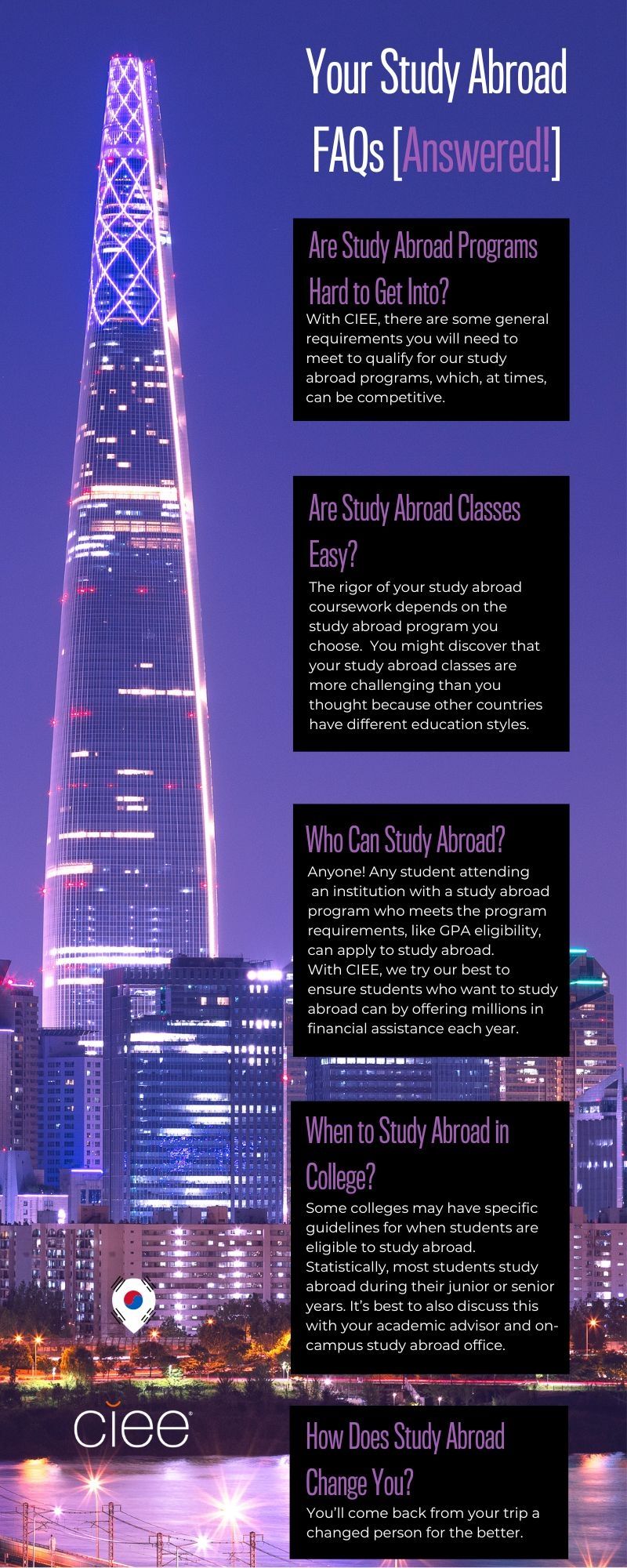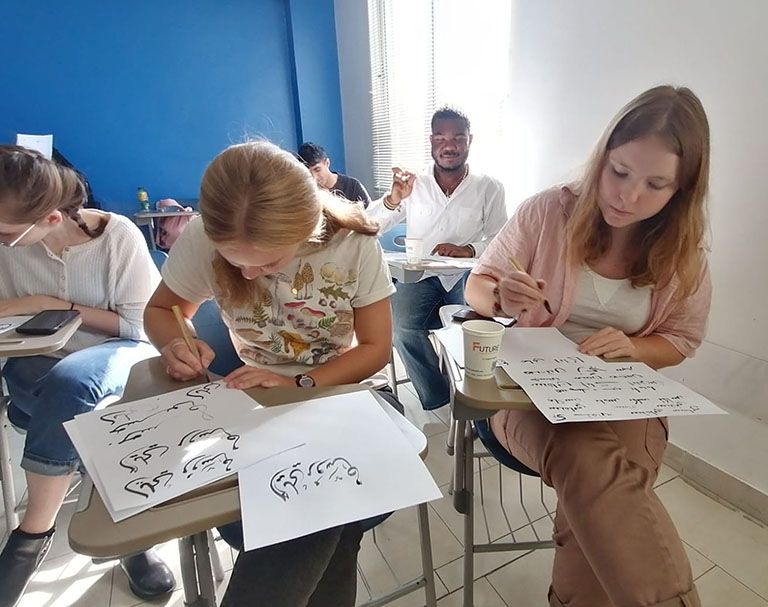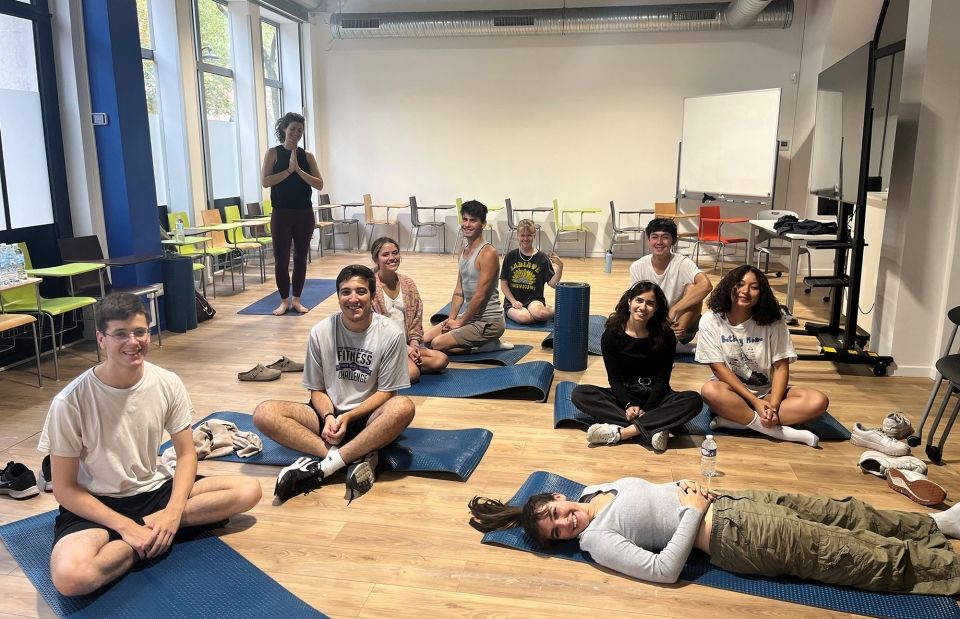Your Study Abroad FAQs Answered
We know you put a lot of thought into choosing the right study abroad program. It makes sense you might have some questions about the process.
So, here we outline some of the most frequently asked questions students ask about studying abroad. Use it as a general overview of what our programs are like and be sure to note the many rewards of an international adventure.

Are Study Abroad Programs Hard to Get Into?
With CIEE, there are some general requirements you will need to meet to qualify for our study abroad programs, which, at times, can be competitive. Most of our programs require an overall 2.5 or 3.0 GPA.
Before planning your study abroad trip, it’s a smart idea to discuss your travels with an academic advisor and study abroad counselor on your campus. An advisor will be able to determine if you’re eligible for a study abroad program and to ensure the program you choose will keep you on your academic track.
A study abroad counselor will also be able to review other important details about the program and will serve as a resource throughout the planning process. And we’re available too as a resource to answer any of your questions.

Are Study Abroad Classes Easy?
The rigor of your study abroad coursework depends on the study abroad program you choose.
You might discover that your study abroad classes are more challenging than you thought because other countries have different education styles.
For example, the U.K. style of education typically focuses on a narrower number of subjects but really dives deep into the matter. Some countries may have a more student-independent style and others may be research-focused. On the other hand, you might find that you prefer a non-American education style and really enjoy the class structure.
It’s also important to be mindful that you may experience some communication barriers in class. While most of our study abroad courses are taught in English, a good number include the local language.
Even if a class is taught in English, the dialect or accent might be unfamiliar, and even cultural references or common phrases used during certain lectures may be confusing. Think of unusual common American phrases that you understand but international students might have trouble deciphering like, “raining cats and dogs,” or “a wild goose chase.”
You’ll need to be diligent to ensure that you’re understanding your professors and the course content correctly.
Another thing to keep in mind: Studying abroad is fun and promises the adventure of a lifetime. However, you may find that balancing your explorations with schoolwork can be overwhelming. Take a look at some common challenges you may face during a study abroad trip and try to stay on top of your studies as much as possible by finding a study buddy, meeting with professors one-on-one, and staying on top of coursework as much as possible. Having a good study foundation will be helpful for your ultimate study abroad success.
Who Can Study Abroad?
Anyone! Any student attending an institution with a study abroad program who meets the program requirements, like GPA eligibility, can apply to study abroad.
With CIEE, we try our best to ensure students who want to study abroad can by offering millions in financial assistance each year. We offer diverse scholarships and grants options broken down into three scholarship types:
- Need-Based Scholarships: Based on financial need
- Merit-Based Scholarships: Based on academic standing
- Other Funding: Based on alumni status or specific program choice
Find what type of assistance you’re eligible for to help make your study abroad dream a reality. And we’re here too if you have any questions.
Also note that while we encourage all students to study abroad, there are some study abroad locations that might have different cultural views on a variety of topics that might be important to you, like gender, socioeconomic status, race, or sexuality. Take a look at our City-Specific Resources page to get a better sense of conditions and cultural attitudes you might encounter in different study abroad cities.

When to Study Abroad in College?
Some colleges may have specific guidelines for when students are eligible to study abroad. Statistically, most students study abroad during their junior or senior years. This is due to a variety of factors such as already having a declared major by the time you’re an upperclassman, a more robust GPA, the ability to align credits with your academic track, and more.
It’s best to also discuss this with your academic advisor and on-campus study abroad office – they’ll be able to provide you with plenty of details on your school’s study abroad policies and more.
No matter when you choose to study abroad, we recommend planning your trip as soon as possible! We offer a ton of different options so getting a sense of what you’d like to achieve during a study abroad program ahead of time will help as you continue your studies. Make sure to check out our Planning Study Abroad page for a broad overview of the study abroad process.
How Does Study Abroad Change You?
There’s no denying that a study abroad experience will change you. But we promise you’ll change in all the best ways. After your adventure of a lifetime, you’ll gain:
- An expanded (and quite literally, global) perspective
- Lifelong connections
- Essential skills that will last a lifetime (and will help you achieve a competitive edge)
- The tools and experiences to become best version of yourself
Learning from others from diverse backgrounds, gaining cross-cultural competencies, and navigating the ins and outs of international traveling (even something mundane like learning new transportation systems) will provide invaluable experience. You’ll come back from your trip a changed person for the better.

Read More: Your Study Abroad FAQs [Answered!]
What do you study abroad for?
The purpose of studying abroad is different for each student. Some students are passionate about learning new cultures, some really want to practice their language learning skills in a country that primarily speaks it, and others may simply want to experience living abroad while earning college credits.
No matter what your reason for studying abroad is, one thing is guaranteed: You will end the experience as a completely different person than when you started. And we mean this in the best way possible! A study abroad experience guarantees you’ll take in the world and gain a more global perspective, make lifelong connections, gain a competitive edge, and become the best version of yourself.

Read More: What are Your Goals for Studying Abroad?
Do employers look at study abroad?
Absolutely! Adding your study abroad experience to your resume is a great way to positively stand out to employers.
Learning the way of life in a new country shows adaptability; not to mention you’ll gain tons of confidence and independence while doing so. You’ll also be communicating with diverse groups of people each day, so your interpersonal skills and ability to work with multicultural groups will greatly improve.
Plus, studying abroad takes guts! As you live in a new and unfamiliar place and dive into academic work abroad, you’ll absorb a ton of new information and quickly learn how to problem-solve, which is a desirable quality in a future employee. Studying abroad will provide you with skills that will last a lifetime – both personally and professionally!
Read More: How to Put Study Abroad on Your Resume: 4 Steps
How Do You Qualify for Study Abroad?
To better understand how to qualify for study abroad, start discussing your study abroad plans with an academic advisor and study abroad counselor on your campus. They’ll be able to determine your eligibility for a study abroad program and ensure that the program you choose aligns with your academic goals.
They’ll also be able to go over important study abroad details with you – for example, specific program costs and GPA requirements – to best understand how you can plan your study abroad travels.
Talking with the experts at your school ahead of time will be key to understanding how to qualify for study abroad.
@cieestudyabroad Study Abroad FAQ: How do you qualify for study abroad? #ciee #cieestudyabroad #studyabroad #studyabroadprograms #college #studyabroadadvice #studyabroadtips #collegeadvice Lisztomania - Phoenix
Read More: What is Study Abroad? Everything You Need to Know!
What GPA Do You Need to Study Abroad?
Each of our study abroad programs have varying overall GPA requirements, although many of our programs require a 2.5 GPA. To better understand the requirements, talk with the experts on your campus to determine what your overall GPA is. If you meet our general minimum 2.5 GPA requirement, start browsing our study abroad locations and programs that best fit your personal and academic goals.
If you’ve always been dying to explore ancient Japan, look at our specific study abroad programs in the country to determine your eligibility. Or, if you’ve always been fascinated by a psychology-specific program in another country, filter your location and program search by subject, and see which study abroad programs you can qualify for with your GPA.

Read More: 5 Best Places to Study Abroad for Psychology
Do Colleges Pay for Study Abroad?
This depends on the college you attend! Some colleges offer individual study abroad scholarships that might help cover study abroad program costs or travel fees.
Again, the experts at your school can support you with this; your on-campus academic advisor and study abroad officer will have more details about different study abroad scholarships and financial aid available at your school. They’ll be able to point you in the right direction.
Students also have the opportunity to apply for scholarships and grant options directly through CIEE. In fact, we offer millions each year to help make students’ study abroad dreams a reality. Check out our options and make sure to fill out the scholarships and grant portion of your CIEE application!
Read More: Study Abroad Scholarships: Everything You Need to Know
Is it Cheaper to Study Abroad vs. Studying in the United States?
This varies based on a lot of different factors including your own college fees, your specific CIEE Study Abroad program, and other out-of-pocket expenses like airfare, spending money, and more.
So, to best break down whether it’s cheaper to study abroad vs. studying in the United States, it’s helpful to determine how much a semester costs on your campus. If you don’t know this off the top of your head, speaking with the experts, including your on-campus financial aid office, will help you determine this.
After establishing your institution costs, look at different CIEE programs. The cost you’ll see associated with different programs is CIEE’s one-time fee that covers most expenses, including:
- Tuition
- Housing
- Pre-departure advising
- Orientation
- On-site staff and 24/7 emergency support
- Culture and co-curricular activities
- Travel protection
Some of our short-term study abroad programs, like January (also known as J-term) programs, cost as low as $3,650, and some summer programs cost as low as $4,250. While this may be cheaper than a semester at your school, note that these programs are not considered semester programs, and fall in between traditional semesters.
However, if a short-term study abroad program makes the most financial sense for you, apply! You’ll be receiving extra credits toward your degree and exploring an entirely new city abroad. There’s no wrong time for a study abroad adventure.
Read More: Short-Term Study Abroad: Everything You Need to Know
Importantly, some of CIEE’s semester-long programs might still be less expensive than a semester at your institution! For example, our semester-long Liberal Arts program in the beautiful Dominican Republic costs as low as $13,950. Take a detailed look at our study abroad programs to help you nail down the total cost.
And don’t forget about CIEE’s robust scholarships and grant options to help support your study abroad trip. We also recommend budgeting as much as you can ahead of your travels to save some spending cash once you arrive at your incredible study abroad destination.
And CIEE support staff is always available to help you with any questions you might have.
@cieestudyabroad Study Abroad FAQ: Is it cheaper to study abroad vs studying in the US? #ciee #cieestudyabroad #studyabroad #studyabroadprograms #college #studyabroadadvice #studyabroadtips #collegeadvice Love Is Around Us - Animal Island
Read More: Top 10 Most Affordable Study Abroad Programs

Find The Study Abroad Programs & Support You Need With CIEE
It makes sense to have lots of questions as you plan a study abroad adventure. And we’re here to help! Lean on us and the experts on your campus to help you piece it all together. You got this. All that’s left to do is get started. Explore our programs and start your application today!

